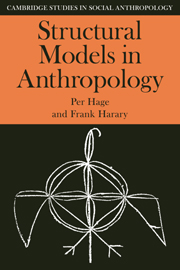Summary
My problem is simple. How can a modern social anthropologist, with all the work of Malinowski and Radcliffe-Brown and their successors at his elbow, embark upon generalization with any hope of arriving at a satisfying conclusion? My answer is quite simple too; it is this: By thinking of the organizational ideas that are present in any society as constituting a mathematical pattern.
Edmund Leach, “Rethinking anthropology”In a modern classic of New Guinea ethnography, Raymond Kelly (1974) develops for the analysis of Etoro social structure a logical approach that is clearly meant to have general application. The logic is based on an analysis of the concept of siblingship, which he defines by a principle of transitivity or transitive equivalence:
The recognition of siblingship as a principle of relationship (rather than merely a unitary element of structure) necessitates a redefinition of the term, and one that will effectively extract siblingship from the familial context which has heretofore served as its primary referent. This can be accomplished by drawing on the relational concept of transitivity (Feibleman and Friend 1945:21). A relationship between two elements (X and Y) is transitive when it is contingent upon, and in this sense defined by, their respective relations to a third element (M). (Transitive relations are thus inherently indirect, being mediated by a third element.) I will be concerned with only one specific type of transitivity, that in which the relationship of each of the two elements (X and Y) to the mediator is identical. […]
- Type
- Chapter
- Information
- Structural Models in Anthropology , pp. 65 - 92Publisher: Cambridge University PressPrint publication year: 1984

